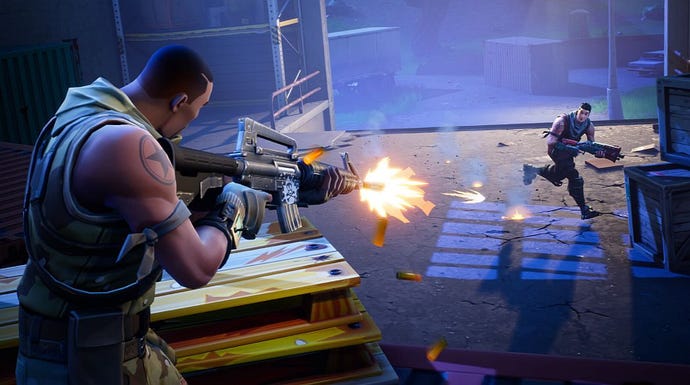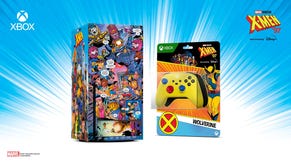Fortnite is a true next-gen game
The success of Fortnite isn't about next-generation hardware, but the next-generation of games players.
This is the generation raised on free games, or games that cost pennies. This is a generation of players accepting of cosmetic costs, where a couple of dollars for a new skin is not just perfectly acceptable, but a given.
This is the generation of players who played games on hand-me-down hardware, old phones, and cheap $100 tablets. Not $400 games consoles and $60 games. Who on earth would pay that to play one game? The idea is insane, the reality of the costs preposterous.
Fortnite's structure suits that mindset. It's free to begin with and you can buy a Season Pass to unlock gear and rewards as you play. But it's also a magpie, grabbing elements established elsewhere and applying them regularly to keep the game fresh. Limited time modes come and go. A weekly update drops new weapons and clears out old ones. It's the new Xur. Drop rates are tweaked, items are buffed and nerfed. Millions of players flock to the game every Thursday to hammer out seven challenges and earn that extra XP. For that next-gen player it's the new Destiny or The Division.
It's not the messiah. It launched poorly, with Save The World an expensive patchwork of co-op survival shooter. Quick thinking, eliminating the cost and the reuse of assets meant Epic was able to tack on a battle royale mode. Buzz and luck got it an audience, word of mouth got it the marketing it needed to reach the playground. It's taken off and left PUBG, its clunkier rival, in the dust. Originators like H1Z1 are even more severely wounded, scrabbling for new ideas when it's clearly too late. History is written by the victors.
And there's the cross-platform issue. Not being able to play across consoles for PS4 and Xbox One sounds ridiculous to a new generation of players. It's the same situation Nintendo was in five years ago, when kids asked the question "why can't we play Pokemon or Mario on mobile?" Any justification just sounded ridiculous then, and after the walls came down and Pokemon Go briefly conquered the Earth, we all reflected on that artificial barrier like it was asinine. No cross-console play is a wall of breeze blocks just waiting to be pushed over.
Fortnite isn't the only free-to-play game that's racking up millions of daily next-gen players but it's more accessible than Roblox or Warframe. It looks pretty, games last no more than 25 minutes, and it's simple to play. That's not to say it's "simple", or as the snooty like to deride, "casual". It can be deeply strategic as much as reliant on twitch skills. Staying out of the line of fire and watching rivals die is as important a decision as pulling the trigger yourself.
And then like all online games it has a strong community, where people go to socialise and catch-up as much as play. Again, it's a new generation of players that favour a quick game with friends over the mean old bastard that is social media. Social media is something your parents do. Urgh.
Fortnite's future: new maps and more competition
I don't know exactly what the future is for Fortnite and I'm sure Epic only writes its plans down in pencil. There's an element of winging it, but reacting every seven days is part of the seat-of-your-pants fun. New weapons and gear like the jetpack will come and go, there may even be a new Fortnite map further into 2018. A mobile launch is going to do nothing but push the overall numbers up (although maybe that's as much to keep the clones in check as it is to find more players) but the player base will inevitably decline at some point. That's a danger for fads (and all games are fads), they can soon fall out of favour.
There's also the competition. Larger publishers are slower to react but their guns are bigger when they eventually roll them onto the lawn. The battle royale genre is the next big thing and there will be casualties as more games try to push in on the turf. But imagine what the makers of Call of Duty, or Battlefield, or The Division could do with their multiple studios and thousands of developers. Or maybe they won't try it, maybe the secret to battle royale's success is the nimble nature of the teams making the games. Ubisoft is doing a grand job of keeping Rainbow Six, Wildlands and Assassin's Creed alive through service, but could it scale down to weekly refreshes?
And maybe talking about the big publishers is irrelevant, anyway. Because maybe this next-generation of players doesn't give a hoot about who Activision, Ubisoft or EA are. This is the generation raised on free and cheap, who only now are picking up a discounted Xbox One, or a handed-down PS4. This is a generation that probably doesn't even read games websites, is cynical of YouTubers, oblivious to clunky marketing and blocks ads. This next-generation of players is new blood, but also a reminder of how quickly the standard becomes stale.
And yet… Fortnite has made it. It's reached the masses, the millions who play games daily. Where 99 games release into oblivion, Fortnite has survived to become the one. It's not the only one, but it's the one everyone is talking about right now. The one that's hooked the next-generation of gamers, hundreds of hours deep into a free game so many dismissed and ignored.











